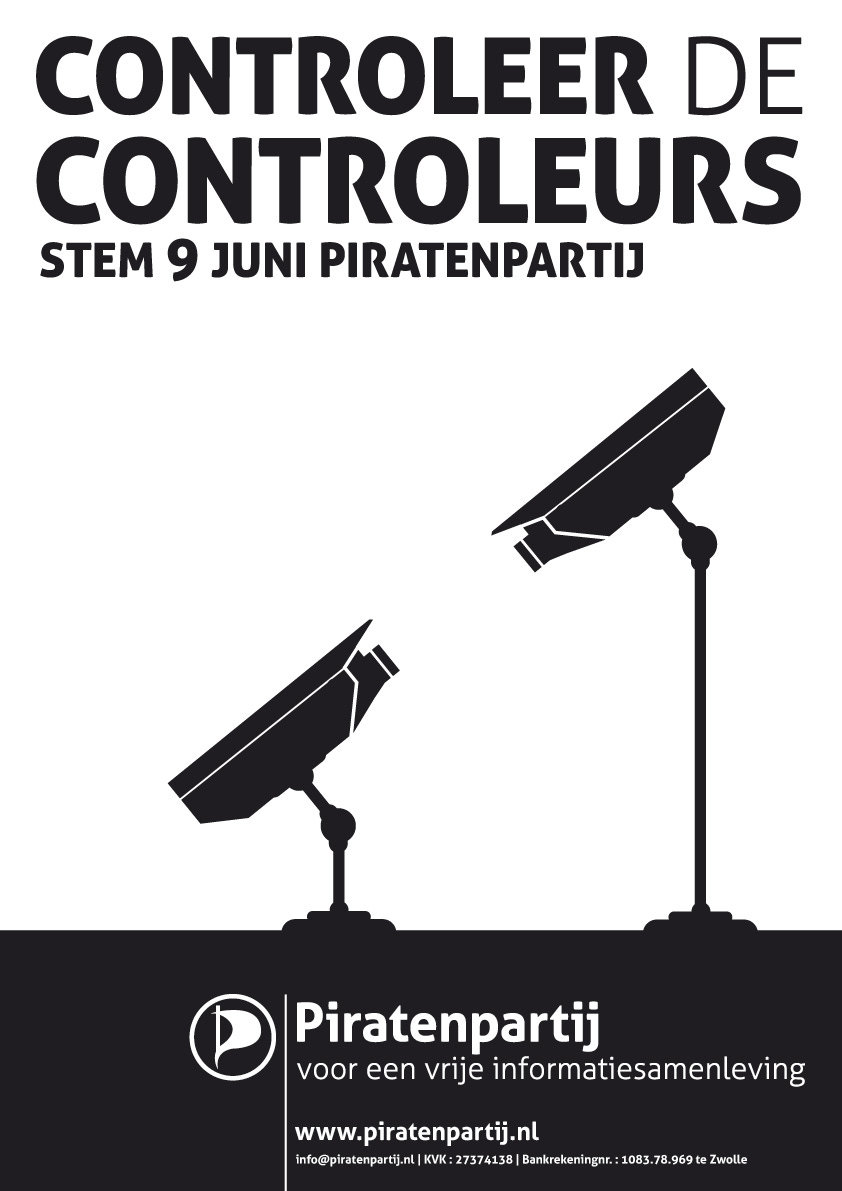The first time I burned out
A grassroots campaign squeezed into four frantic months
The first time I burned out was during the Dutch parliamentary elections of 2010. I was writing my graduation thesis about networked music marketing for my bachelor's degree.
But that writing came to a sudden halt.
There was this new political party in the Netherlands, part of a broader movement that had already won seats in Sweden. It emphasised how 20th-century frameworks could not simply be applied to a digitalising society without putting hard-earned civil rights under pressure. Its key points were privacy, intellectual property reform, whistleblower protection, and having experts in government who actually knew their way around the connected digital world.
Its name was the Pirate Party, or ‘Piratenpartij’ in Dutch.
Computer club vibes
About a year before the Dutch national parliamentary elections, a small group of people announced that they would officially register the party. Anyone interested was called to join a meeting in my hometown, Utrecht, which is situated in the centre of the country. I decided to drop by.
I was immediately reminded of the in-person alliance meetings of an online web game I used to play as a kid. Computer club vibes with a high degree of social awkwardness. So socially awkward, that rather than asking the bar staff for the WiFi password, someone used a tool to ‘sniff’ the password to the insecure network. Why talk to someone for 10 seconds when you can crack your way into the network in just 5 minutes?
To be clear, I felt right at home.
During the meeting, it was apparent that I was the only person present with a communications background, which is what I was studying at the time. I had also completed a small consultancy project for Bulgaria’s centre-left, social democratic Socialist Party (BSP) the year prior, to assist them with their social media strategy.
By the end of the meeting, I had informally become the party’s communication person and later became the campaign lead in what were perhaps 6 of the most intense months of my life.
The Pirate Party’s strategy was to manoeuvre itself into a kingmaker position in the Dutch splintered political landscape. There is no electoral threshold in the Netherlands, which means you can get into parliament by securing one seat — about 63,000 votes in 2010. After the elections, parties try to form an electoral majority government coalition. In the case that only one or two seats were needed to attain that majority, the Pirate Party would be in a good position to have its key points represented in exchange for support.
The road to getting those 63k+ votes is a rocky one, though.
We had to register the party itself. Create internal structures for the party. Party charters. Bylaws. Membership administration. Build up volunteer networks and coordination. Create an election manifesto. Build media attention.
It was a lot.
Especially for a group of politically inexperienced people who were chronically online long before it became a mainstream aspect of our culture.
But the intensity was about to get dialled up to an extreme.
The sudden countdown
On 20 February 2010, the ruling coalition collapsed. And with that, our timeline for the 2011 elections. A new date was set. 9 June 2010. We had just under four months.
Now there was even more to do.
Register for elections. Select the candidates for our party list. Create campaign structures. Defend against attacks from industry interest groups and political opponents, while also dealing with politically sympathetic parties that parroted our talking points to avoid losing votes to us.
The most challenging part was getting the party registered for elections. We wanted full national representation, which meant gathering 30 supporting signatures in each of the 19 constituencies, including the overseas territories.
That requirement was especially tough in places where we had little presence. In some cases, people had to show up at local city halls at a specific date and time to place their signatures. This was always on workdays and before working from home became normalised.
But we made it.
And with it, we had grown the party even further.
It had actually grown so much that it became hard to manage, because the core group of people were so busy with a million other things.
Deeper into the campaign, there were people joining our IRC chat channels every day, asking how they could help. But everyone was too busy to answer and coordinate.
We attempted to establish a self-organising structure of task forces, where tasks could be undertaken with the approval of a certain number of members. However, these too struggled under the weight of tasks that the core group was handling.
Nineteen hours a day
Towards the end of the campaign, I spent about 19 hours a day on my computer or phone, talking to journalists, supporting candidates, managing social media, and coordinating task forces.
I didn’t see myself living in the Netherlands long-term at that time, so I had myself placed near the bottom of the list, allowing me to invite myself to public debates to represent the party.
The work never ended. When I would go to sleep, the work continued in my dreams. I hadn’t opened the document in which I was writing my graduation thesis in months.
The campaign failed to secure us enough votes to enter parliament.
Small consolation: despite mainly working behind the scenes, I ended up with more votes than Barry Madlener, the current Dutch Minister of Infrastructure.

World of Warcraft and grief
I spent the following months playing World of Warcraft, mixing music, practising aikido, walking the family's border collie, and processing my mom’s death, who had passed away just before I got involved with the Pirate Party. I felt a bit guilty about the downtime, but in retrospect, it was just my way of dealing with burnout. I was 24.
It wasn’t time wasted. I reflected and changed my approach to my thesis. The resulting work spread online, landed me my first proper job before I had even graduated, and led to speaking invitations at music conferences. In Cannes, as I stood backstage about to tell a room of seasoned industry professionals my naive view of their business, I wanted to throw up. It didn’t help that the person on stage before me was Mark Ronson.
A year later, I was leading a team at a music streaming service.
Still, it took years for me to understand that during my World of Warcraft period, I wasn’t wasting time. I was preparing for something I didn’t even dare to dream.
What I learned
Delegate. Practically the entire core team working on that campaign burned out. Things moved so fast that at one point, there was no time to onboard new people. But the tasks kept mounting. It was a vicious cycle. A trap nobody recognised until it had sprung. None of us had done this before. I doubt anyone in the country had.
We should have slowed down and then restarted with a broader base, instead of relying on the same 50 active people, including the 20-person core team.Prioritise. Slowing down is hard because it forces you to cut. But cutting always happens, whether you plan for it or not. If you try to do everything, you end up doing it all with less focus and quality than if you dedicated yourself to one thing. Deciding what not to do is just as important as what to do first.
Often, a team’s well-being doesn’t find its way onto to-do lists explicitly, so it doesn’t get prioritised. In periods of crunch time, which lasted for four months in our case, this means that higher-priority items take precedence over this non-priority concern. Beware.
Nowadays, my go-to prioritisation framework is the MoSCoW method, which I learned about a few years later through product management at a startup.Respect downtime. Your mental and physical health are intertwined. I put my body under a lot of stress while eating and sleeping poorly. I masked it well, but I had wrecked my nervous system. Playing games helped me bide time while I recovered. Back then, I didn’t recognise it as recovery, and now I’d handle it in another way.
For a long time, I felt embarrassed about that. But 15 years have passed, and I think that young dude did precisely what he needed to, despite having no idea what he was doing.
I’ve never actually written about this. Maybe your version doesn’t involve elections, online games, or Mark Ronson. Still, most people eventually stumble into their own version of the same story. So maybe reading this helps.
I don’t often think about those months, but they shaped me. They showed me the cost of trying to do everything and the value of learning when to stop. That lesson still holds.
It’s the first of October, which means my “offline after dark” challenge has started for the month. You can join the adventure! Learn more and join in here:


